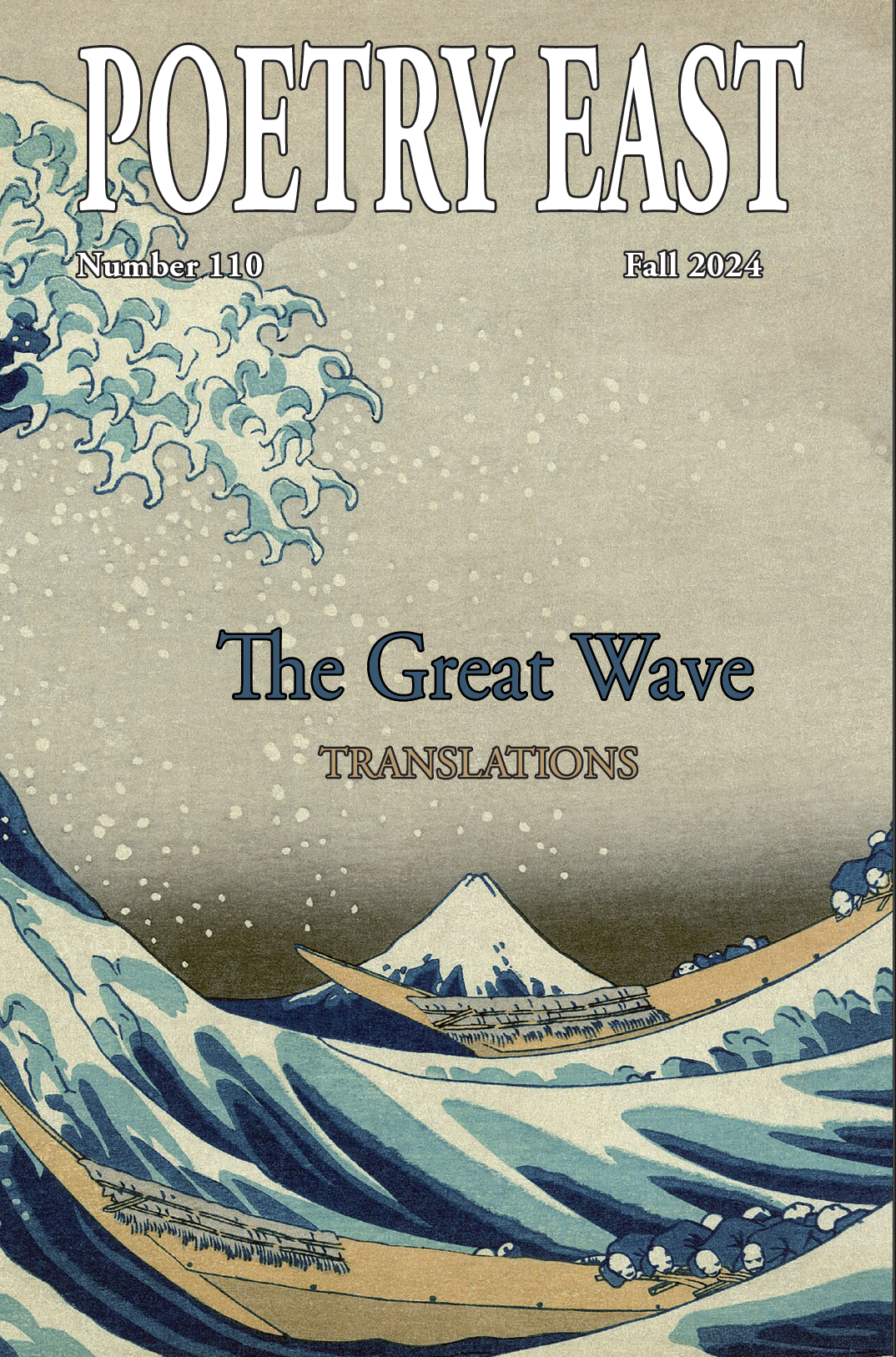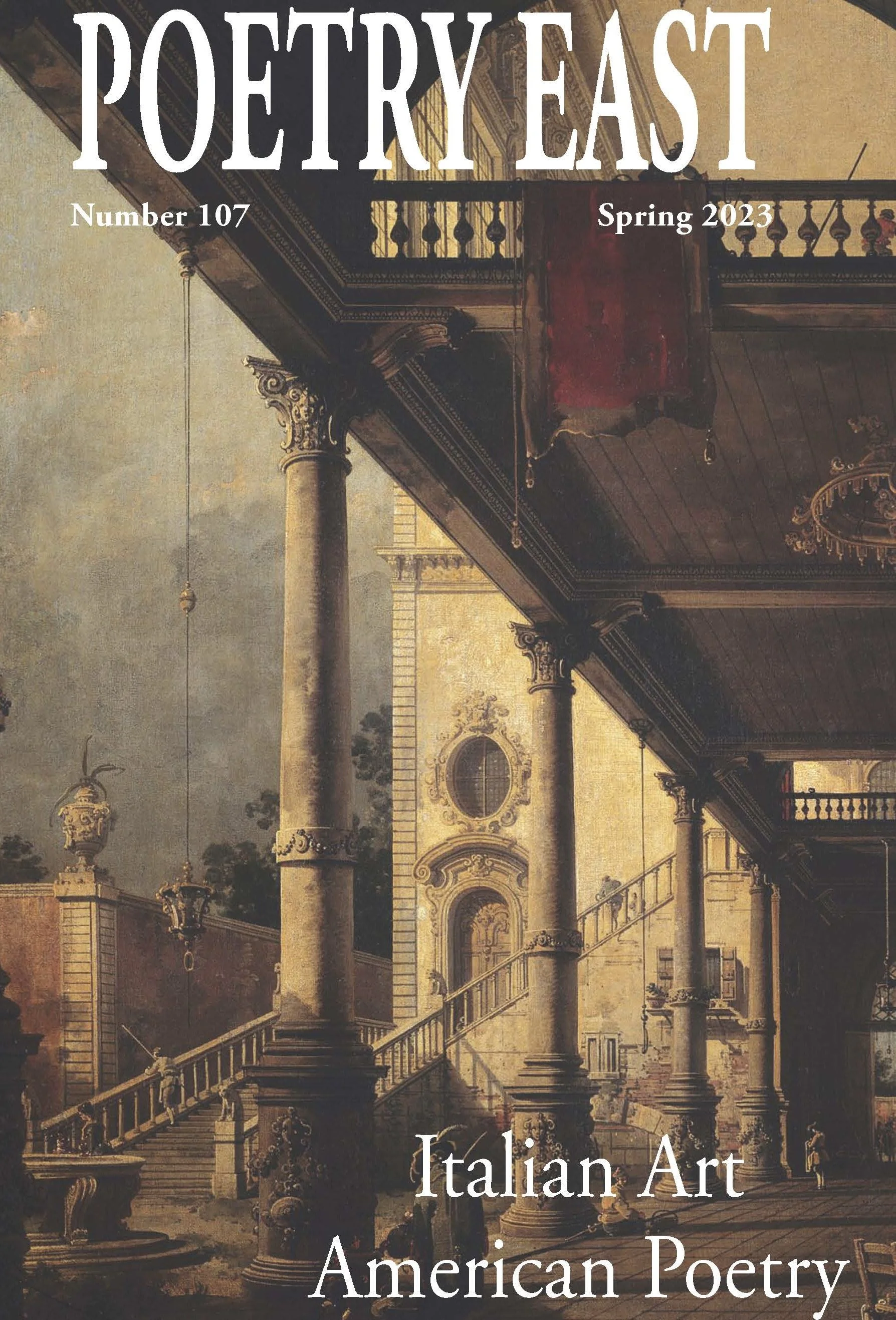Poetry East #110—“The Great Wave”
Poetry East is happy to announce
publication of our Fall 2024 issue:
Poetry East #110: The Great Wave
Order your copy today at www.poetryeast.org/order!
Poetry East#110 is a retrospective volume of outstanding translations that have appeared in the journal over the years. Richly illustrated with Hokusai's wonderful series of woodblock prints, "Thirty-Six Views of Mount Fuji," the volume includes timeless poets from around the world—Philippe Soupault, Bertolt Brecht, Pablo Neruda, Tomas Tranströmer, Yvann Goll, Maria-Mercè Marçal, Lao Tzu, Hitomaro, Kabir, Ovid, Sappho, and many others. Poetry East would especially like to thank our many translators whose invaluable contributions make possible this remarkable and rewarding international conversation.
Poetry East is also pleased to provide an update on its forthcoming publications. In the spring of 2025, we will release Poetry East #111, an anthology devoted to Dutch literature and painting, featuring contemporary Dutch poets as well as the works of Vermeer, Van Gogh, and Mondrian.
Please note that Poetry East is now accepting orders for single issues only: we will no longer be accepting subscriptions. Please visit our website to review our list of back issues that are still available for purchase.
POETRY EAST #109—“CLAUDE MONET”
Poetry East #109 is devoted to the paintings of Claude Monet, accompanied by poems from 39 of the best poets writing today. Featuring 59 color reproductions of Monet's paintings, this volume is a must-read for people interested in ekphrastic poetry—poems about art. Despite Monet’s world renown as a painter, we are sure readers will find something new to love in this issue. The depths of these works—timeless and ever evocative—have inspired the poets in this issue to create new poems that delight and edify.
POETRY EAST #108—“SCOTLAND”
Poetry East is excited to present our Fall 2023 issue, Scotland. This special issue features the work of ten prominent Scottish poets set alongside photographs taken on editor Richard Jones’s recent trip to Scotland.
POETRY EAST #107—“ITALIAN ART, AMERICAN POETRY”
This volume of Poetry East highlights some of Italy’s finest paintings and sculptures. Featured artwork comes from the Uffizi Gallery, Florence; Accademia Gallery, Venice; Vatican Museum, Vatican City; and Borghese Gallery, Rome. These magnificent works of art are united with the work of American poets including Billy Collins, Judith Harris, Ted Kooser and Connie Wanek. Together, these works of Italian art and American poetry span both nation and time, speaking to the beauty of life. We hope you find the art and poetry in this issue as moving and inspiring as we have.
POETRY EAST #100—“THE BLISS OF READING”
“With the publication of “The Bliss of Reading”, Poetry East celebrates two milestones—its 40th anniversary and its 100th issue. Editor Richard Jones has selected 100 poems from Poetry East’s first 100 issues for this stunning special anniversary edition that includes the work of such literary giants as Charles Bukowski, Billy Collins, Denise Levertov, Czeslaw Milosz, Rainer Maria Rilke, and Lynne Sharon Schwartz. The final poem of the issue is by Jones himself, a sonnet in which he writes that he has been guided by “no manifesto, no radical plan” during his four decades of publishing the journal. Instead, he is simply driven by “the work of poetry: beauty, mercy, and peace.”
—Miles Harvey, DePaul Publishing Institute Director
“PARIS”—Poems by Richard Jones
In Paris, Richard Jones establishes himself as the flâneur, walking through the city, and in turn, his own life experiences. Although Jones places his poems against a storied and legendary backdrop, the poems themselves are deeply intimate and reflective. Paris is not a romance, but rather a spiritual pilgrimage. Thus, the reader is invited to become one with the flânuer, accompanying the poet on his journey through Paris and through the joyful strangeness of human existence.
POETRY EAST #98/99, “ORIGINS”
“Where do poems come from? How are poems written? The question haunts both writer and reader. This spring, if I had my way, I’d reprint all the wonderful essays from the first three “Origins” volumes, and then include another hundred or so new poets and new stories. I picture a volume of a thousand pages, each poem equally enigmatic, each essay equally able to take us to the mountaintop or down into the valley better to see the alchemy of composition.”
—Richard Jones, Poetry East #98/99
POETRY EAST #97, “CHICAGO”
“When walking under the rigid, black walls of Mies van der Rohe’s Federal Plaza, it is impossible not to notice the twisting, red steelwork that is Alexander Calder’s Flamingo. As perfectly named as it is positioned, the sculpture calls to mind the strangeness of those red-pink birds bent to fishing the waters of Chile, Florida, and the Caribbean (or, indeed, might even recall the neon-pink, plastic lawn ornaments of the 1970s). The curvature of the metal reminds one of the backward bending “knees” of flamingos, which, in fact, are not what they seem. A flamingo’s knees are actually located near its body and are covered by the bird’s pink plumage. What we often mistake for its knees are really its ankles. In truth, flamingos are constantly balanced on tiptoes like dancers en pointe. This speaks perfectly to Calder’s sculpture which the artist, known for his hanging kinetic works, dubbed a “stabile,” a type of freestanding, stationary mobile. This word sounds deliberately like the word “stable” and speaks both to the sculpture’s and the feeding bird’s poise. Looking on, one has no doubt that, somehow, the five stabilizing supports will continue easily to hold the fifty ton sculpture, and yet, at the same time, it seems that any moment now the curved neck will lift from feeding, the astonishing head will emerge, and the whole work of art will fly away.”
—Christopher Watkins, Poetry East Assistant Editor
Click here to order
“THE OBSCURE HOURS”—Translations by Richard Jones
As a young reader, I was especially moved by poetry in translation. Those poems, often from centuries past, depicted cultures and sensibilities quite unlike my own… And yet the many voices, so richly human, traveled across time to whisper with such immediacy that I’d shiver with recognition.
The Obscure Hours includes poems in translation by: Rilke, Bashō, Petrarch, Apollinaire, Machado, and Kafka among others.
—Richard Jones








